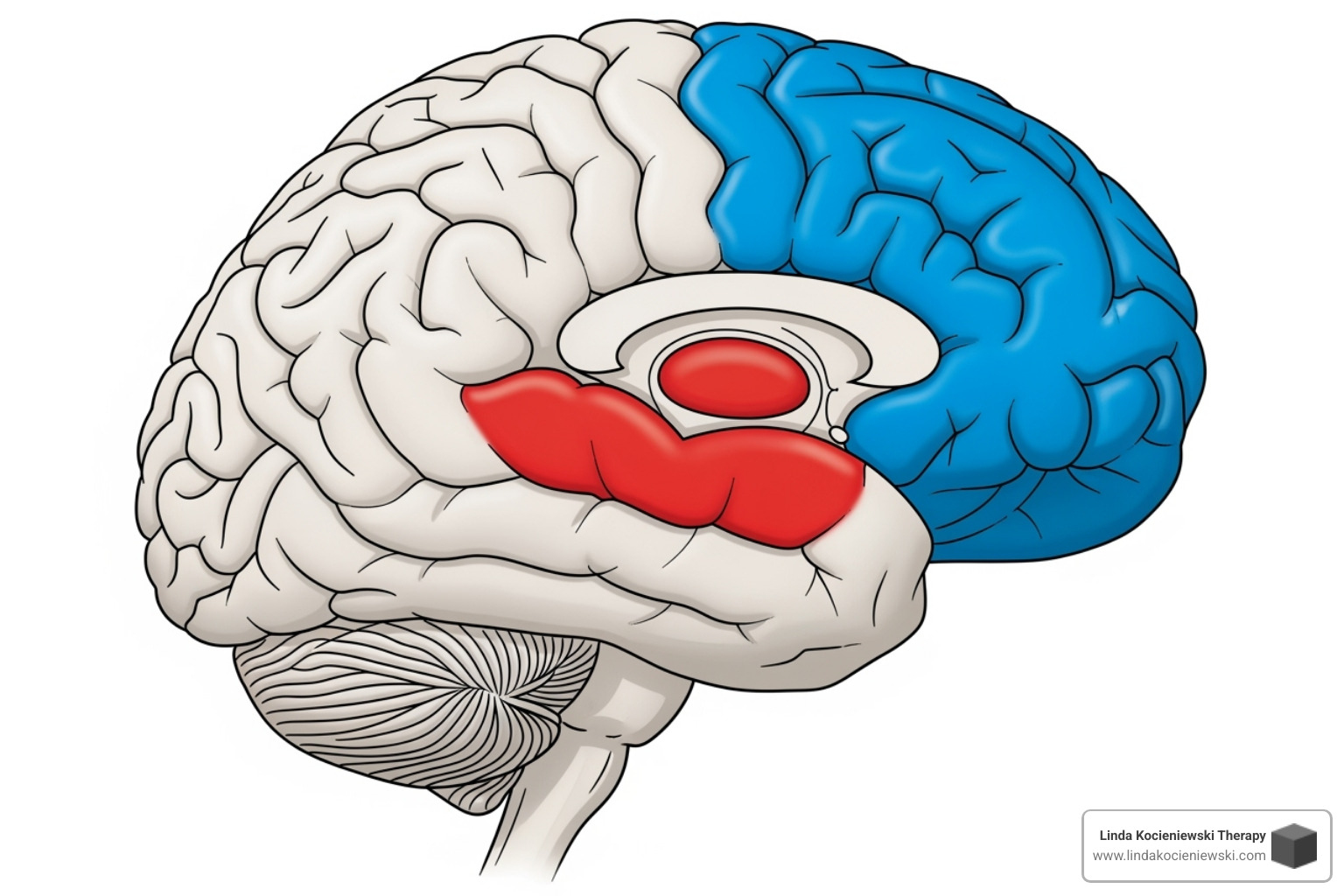Handle With Care: Strategies for Emotional Self-Regulation
Mastering Your Inner World: The Power of Emotional Regulation Skills

Imagine this: You open your inbox to find a blunt, critical email from your boss. Your heart starts pounding, your face flushes, and your immediate impulse is to fire back a defensive reply. Or maybe you shut down completely, the weight of perceived failure making it impossible to focus for the rest of the day. These moments, where our emotions threaten to take the driver's seat, are universal. The difference between a knee-jerk reaction and a considered response lies in a crucial set of abilities: emotional regulation skills.
Emotional regulation is your capacity to consciously understand, influence, and respond to your emotional experiences in a healthy and adaptive way. This isn't about suppressing feelings or pretending you're not upset. It’s the opposite. It’s about acknowledging your anger, anxiety, or sadness without letting it dictate your actions. It's the art of influencing which emotions you experience, when you experience them, and how you express them.
These skills are fundamental to mental and emotional well-being. They empower you to steer life's inevitable challenges with greater resilience, leading to more thoughtful decision-making, stronger relationships, and a deeper sense of personal control. The most empowering truth is that emotional regulation is not an inborn trait reserved for a lucky few; it is a collection of skills that can be learned, practiced, and strengthened over time. By developing them, you create a vital pause between feeling and reacting—a space where you can choose a response that aligns with your long-term goals and values. This is the journey from being at the mercy of your emotions to becoming the master of your inner world.

Understanding the 'Why' and 'How' of Your Emotions
To master our inner world, we must first understand our emotions. This starts with self-awareness—spotting and naming your feelings accurately. This awareness enables impulse control, your ability to pause and think before you react, ensuring your actions align with your values.
A key part of this is recognizing your emotional triggers: the situations, thoughts, or memories that spark an emotional response. Knowing your triggers allows you to prepare for healthier reactions. Crucially, our emotions are tied to our bodies through the mind-body connection. Our bodies can hold hidden memories that affect how we feel, which is why some therapeutic approaches work directly with this link to heal deeper emotional wounds. To learn more about this connection in healing, you can explore More info about trauma recovery.

The Brain Science Behind Your Feelings
Your emotions are tied to your brain's wiring. The amygdala, your brain's "alarm system," controls the primal fight-or-flight response. When triggered, it can make you react impulsively. However, your prefrontal cortex is the "executive control center," responsible for clear thinking and problem-solving. Emotional regulation skills help create a pause, allowing your prefrontal cortex to engage for a thoughtful response.
The autonomic nervous system (ANS) also plays a key role, with its "gas pedal" (sympathetic system) for stress and "brake pedal" (parasympathetic system) for calm. Good regulation helps you engage the "brake" to calm your body and mind. The exciting news is that our brains are flexible due to neuroplasticity. You can literally rewire your brain for better emotion management through practice. This scientific understanding proves we have the power to shape how we feel. For a deeper dive, you can read about The neural bases of emotion regulation.
Common Roadblocks to Effective Emotional Regulation Skills
Several factors can make emotional regulation harder. Chronic stress keeps your body on high alert, making it difficult to think clearly. Lifestyle choices also play a huge role. A lack of sleep and poor nutrition can throw your emotions off balance.
Perhaps the deepest roadblock is unresolved trauma, which can change the brain and make it hard to process emotions. For many, just identifying feelings is a hurdle. Specialized therapies like EMDR are designed to help process traumatic memories and improve emotional regulation skills. You can learn more about how this works by reading Understanding EMDR Therapy and Its Benefits.
Finally, childhood development shapes our emotional patterns, often through Automatic Negative Thoughts (ANTs) formed early in life. Addressing these deep-seated patterns is a vital part of improving emotional regulation.
Regulation vs. Suppression: A Crucial Distinction
It's crucial to distinguish emotional regulation from emotional suppression. Suppression means pushing feelings away or ignoring them. This is like holding a beach ball underwater—it takes effort and eventually pops up with more force. Suppressed feelings don't disappear; they can lead to more anxiety, depression, and unhappiness.
In contrast, emotional regulation is about working with your emotions. It involves acknowledging what you're feeling, processing it, and then consciously choosing how to respond. This ensures your responses are appropriate and support your well-being.
Here's a quick comparison:
| Emotional Regulation | Emotional Suppression |
|---|---|
| Acknowledging, identifying, and understanding emotions | Ignoring, pushing away, or denying emotions |
| Processing emotions in a healthy way | Bottling up emotions, preventing outward expression |
| Choosing a thoughtful, adaptive response | Reacting impulsively or not at all |
| Leads to reduced stress, improved mental health | Can worsen depression, anxiety, and physical health |
| Fosters resilience and genuine connection | Leads to emotional numbness or explosive outbursts |
| Long-term positive effects | Long-term negative effects |
A Practical Toolkit: Evidence-Based Emotional Regulation Skills
Understanding the mechanics of your emotions is the first half of the equation. The second, more active half is building a robust toolkit of skills to steer them effectively. Developing strong emotional regulation skills is an active process that involves consistently practicing evidence-based techniques. These aren't quick fixes but sustainable strategies that, when woven into your daily life, build lasting resilience and empower you to meet challenges with greater ease and wisdom. For a broader understanding of how therapeutic approaches can support this journey, you might find it helpful to explore What is Psychotherapy?.

Foundational Skills for Daily Life
These core skills are the bedrock of emotional mastery. Practice them when you're calm so they become second nature when you're stressed.
- Mindfulness: This is the practice of paying attention to the present moment on purpose, without judgment. Mindfulness creates that crucial pause between an emotional trigger and your reaction. It allows you to observe your feelings as temporary events rather than being consumed by them. A simple exercise is the 3-Minute Breathing Space: First, notice what's going on inside you (thoughts, feelings, sensations). Second, focus your full attention on the physical sensation of your breath. Third, expand your awareness to include your whole body, holding your experience with gentle curiosity.
- Grounding Techniques: When you feel overwhelmed or dissociated, grounding pulls you out of the storm in your mind and anchors you in the present moment. The 5-4-3-2-1 Method is a classic: Name 5 things you can see, 4 things you can physically feel (your feet on the floor, the chair against your back), 3 things you can hear, 2 things you can smell, and 1 thing you can taste. Other techniques include holding a piece of ice, firmly planting your feet on the ground, or describing an object near you in minute detail.
- Strategic Breathing: Your breath is a powerful, portable tool for regulating your nervous system. Slow, deep breathing, especially with a longer exhale, activates the vagus nerve and engages your parasympathetic ("rest and digest") system. Try the 4-7-8 Method: Inhale through your nose for 4 seconds, hold your breath for 7 seconds, and exhale slowly through your mouth for 8 seconds. Repeat 3-4 times. This simple act can quickly lower your heart rate and reduce feelings of panic.
- Cognitive Reappraisal (Thought Reframing): Our emotions are often fueled by our interpretations of events, not the events themselves. Cognitive reappraisal involves changing your perspective to alter your emotional response. The first step is to identify common cognitive distortions—unhelpful thinking patterns like catastrophizing (assuming the worst-case scenario) or black-and-white thinking (seeing things in all-or-nothing terms). When you catch a distorted thought like, "I completely failed that presentation," you can challenge it: "Is it true I completely failed? What parts went well? What can I learn from the parts that didn't?" Reframe it to something more balanced: "I was nervous and stumbled on a few points, but I also made some strong arguments. I'll practice more for the next one."
- Radical Self-Compassion: Many of us respond to emotional pain with harsh self-criticism, which only adds a layer of suffering. Self-compassion involves treating yourself with the same kindness you would offer a good friend. It has three components: self-kindness (being gentle with yourself), common humanity (recognizing that suffering is a shared human experience), and mindfulness (observing your pain without exaggerating it). When you're struggling, try placing a hand over your heart and saying, "This is a moment of suffering. Suffering is a part of life. May I be kind to myself in this moment."
Advanced Skills for Intense Emotions: Lessons from DBT
For moments of extreme emotional distress, foundational skills may not feel like enough. This is where distress tolerance skills, drawn from Dialectical Behavior Therapy (DBT), become invaluable. Their purpose is not to make the situation feel good, but to help you survive a crisis without making things worse.
- TIPP Skills (for rapid de-escalation):
- Temperature: Drastically change your body temperature by splashing your face with cold water or holding a bag of frozen peas. This triggers the mammalian dive reflex, which rapidly slows your heart rate.
- Intense Exercise: Engage in a short burst of intense physical activity, like running in place or doing jumping jacks, to burn off the adrenaline.
- Paced Breathing: Slow your breathing way down, making your exhale longer than your inhale.
- Paired Muscle Relaxation: Tense a muscle group while you inhale, then relax it completely as you exhale.
- ACCEPTS Skills (for distraction):
- Activities: Do something that requires focus (a puzzle, a craft, cleaning).
- Contributing: Shift focus outward by doing something for someone else (send a kind text, do a chore for a family member).
- Comparisons: Compare yourself to a time you felt even worse to gain perspective, or think of people who are coping as well as you.
- Emotions: Generate a different emotion by watching a funny movie or listening to uplifting music.
- Pushing Away: Temporarily block the situation from your mind, deciding to deal with it later.
- Thoughts: Occupy your mind with something else, like counting, reciting lyrics, or playing a mental game.
- Sensations: Engage your senses with something intense, like a hot shower, a strong mint, or loud music.
Advanced Therapeutic Approaches for Deeper Healing
While daily skills are powerful, deep-seated emotional dysregulation, especially when rooted in trauma, often requires professional support. Attachment-Focused EMDR (Eye Movement Desensitization and Reprocessing) is a highly effective therapy that helps the brain reprocess distressing memories that are the source of emotional turmoil. It doesn't erase the memory but disconnects it from the overwhelming emotional and physical charge. The eight-phase process systematically helps clients access and process traumatic material in a safe, structured way, allowing the brain's natural healing capacity to take over.
For those seeking accelerated progress, EMDR Intensives provide a concentrated format, allowing for significant healing in a matter of days rather than months. As a solo therapist, I specialize in creating a highly personalized and secure environment for this profound work, guiding clients through the complexities of trauma recovery with focused, expert care. This dedicated approach is particularly suited for individuals committed to overcoming the lasting impacts of trauma, anxiety, and depression. To understand more about how this specialized therapy can help, please read about how EMDR therapy helps heal trauma.
Emotional Regulation in Action: Enhancing Your Life and Relationships
Developing strong emotional regulation skills is not an abstract academic exercise; it's a practical upgrade that transforms nearly every facet of your daily life. When you can effectively manage your inner world, you'll notice profound improvements in your professional performance, the quality of your personal relationships, and your ability to parent with patience and wisdom. It’s the key to moving from a life of reaction to a life of intention.

Thriving in the Workplace
In the modern workplace, emotional intelligence (EQ) is often valued as much as, if not more than, IQ. Strong emotional regulation skills are the engine of high EQ, fostering better teamwork, more effective leadership, and improved problem-solving under pressure.
Consider this scenario: You receive unexpected critical feedback on a project you worked hard on.
- Poorly Regulated Response: You feel a surge of anger and defensiveness. You might immediately send a terse email challenging the feedback, complain to coworkers, or withdraw into sullen silence, letting your resentment derail your productivity for the rest of the day.
- Well-Regulated Response: You feel the initial sting of disappointment or frustration. You take a deep breath (a regulation skill) and acknowledge the feeling without acting on it. You remind yourself that feedback is an opportunity for growth (cognitive reappraisal). After a few minutes, you calmly re-read the feedback, identify the valid points, and schedule a meeting to discuss the feedback constructively, seeking clarification and proposing solutions. This response builds trust, demonstrates professionalism, and turns a potential conflict into a catalyst for improvement.
A regulated professional environment is one where conflict is handled constructively, stress is managed effectively, and psychological safety allows for innovation and collaboration to flourish.
Building Stronger Personal Connections
Our most intimate relationships are often where our emotional regulation skills are tested the most—and where they matter most. Your ability to manage your own emotions directly impacts your capacity for empathy, clear communication, and lasting connection.
Imagine a common disagreement with a partner: You feel hurt because they forgot an important date.
- Poorly Regulated Response: You feel a wave of hurt and anger. You might resort to accusations ("You never listen to me!"), bring up past grievances, or give them the silent treatment. The focus shifts from the specific issue to a larger attack on their character, escalating the conflict and creating emotional distance.
- Well-Regulated Response: You feel the hurt and acknowledge it to yourself. You use an "I" statement to express your feeling without blame: "I feel hurt and unimportant when our anniversary is forgotten." This opens the door for conversation rather than slamming it shut. By regulating your initial impulse to attack, you can listen to your partner's perspective, express your needs clearly, and work together on a solution. This de-escalates conflict, builds trust, and reinforces the safety and security of the relationship.
Parenting with Poise: Modeling Emotional Health
For parents, emotional regulation is not just a personal skill; it's a legacy. Children learn how to manage their emotions primarily by watching their parents. When you model healthy emotional regulation, you are giving your children one of the greatest gifts for their future well-being.
When a child has a tantrum, a parent's regulated presence is crucial. Instead of meeting their dysregulation with your own (yelling, threatening), you can practice co-regulation. This means staying calm yourself, which provides a safe anchor for your child's emotional storm. You can get down on their level, validate their feeling ("I see you are very angry that playtime is over"), and offer comfort. This teaches them that big feelings are manageable, not scary. By responding to challenges with patience and empathy, you are actively wiring your child's brain for resilience and teaching them, by example, the foundational skills they will use for the rest of their lives.
Frequently Asked Questions about Emotional Regulation
How does past trauma affect emotional regulation?
Past trauma can fundamentally rewire the brain's and nervous system's approach to emotions. It often shrinks the "window of tolerance," which is the optimal zone where you can process information and respond to life's demands effectively. When you're within this window, you feel calm, present, and capable.
Trauma can push you outside this window with very little provocation. You might be pushed into a state of hyperarousal (fight-or-flight), characterized by anxiety, anger, panic, and feeling overwhelmed. Conversely, you might be pushed into hypoarousal (freeze/shutdown), leading to feelings of numbness, emptiness, disconnection, or collapse. Trauma can also lead to emotional flashbacks, where a seemingly minor event in the present triggers the full emotional intensity of a past traumatic experience. Specialized therapies like EMDR are designed specifically to address these root causes, helping to process the traumatic memories and widen the window of tolerance, which restores the nervous system's natural capacity for regulation.
Can you learn emotional regulation at any age?
Absolutely. Emotional regulation skills can be learned and significantly improved at any age. The brain's incredible capacity for change, known as neuroplasticity, means you are never too old to forge new neural pathways. While the foundational patterns are often set in childhood, adults possess unique advantages for learning, including greater self-awareness, life experience, and a conscious motivation for change.
The primary challenge for adults is that maladaptive emotional habits can be deeply entrenched. It requires consistent effort and patience to override these old automatic responses. However, every time you consciously choose to practice a new skill—like taking a deep breath instead of snapping, or reframing a negative thought—you are strengthening the new, healthier pathway. It's never too late to start.
What is the difference between emotional regulation and emotional intelligence (EQ)?
These two concepts are closely related but distinct. Think of Emotional Intelligence (EQ) as a broad, overarching competency, like being a skilled musician. Emotional regulation is a specific, crucial skill within that competency, like being able to control your tempo and dynamics while playing.
EQ encompasses a wider set of abilities:
- Self-Awareness: Perceiving your own emotions accurately.
- Self-Management (Emotional Regulation): Managing your emotional reactions.
- Social Awareness: Perceiving and understanding the emotions of others (empathy).
- Relationship Management: Using emotional awareness to manage interactions successfully.
In short, you use self-awareness to know what you're feeling, and then you use emotional regulation to manage that feeling effectively. Improving your regulation skills is one of the most powerful ways to boost your overall EQ.
What is the very first step to take when feeling emotionally overwhelmed?
The first step is to anchor yourself in the present moment and calm your physiology. When you're overwhelmed, your prefrontal cortex (the thinking brain) is offline. The priority is to get it back online. Don't try to solve the problem or analyze the feeling immediately. Instead, use a grounding or breathing technique. Try the 4-7-8 breath or the 5-4-3-2-1 grounding exercise. This sends a signal to your nervous system that you are safe, which helps reduce the intensity of the emotion. Only after you feel a bit calmer can you move to the next step: gently naming the emotion you're experiencing ("I am feeling overwhelmed and anxious").
How long does it take to improve emotional regulation skills?
There is no fixed timeline, as it's a lifelong practice, not a destination. However, with consistent and deliberate effort, most people can notice meaningful improvements in a matter of weeks. The key is consistency over intensity. Practicing a five-minute mindfulness exercise daily is more effective than a one-hour session once a month. Early progress often involves becoming more aware of your emotional patterns, even if you can't change them yet. Over time, the pause between trigger and reaction will grow longer, giving you more opportunities to choose a different response. Be patient and compassionate with yourself; you are unlearning years of old habits and building new ones.
Is it possible to be 'too' regulated or emotionally controlled?
This is an excellent question that highlights the difference between healthy regulation and unhealthy suppression or over-control. Healthy emotional regulation is flexible and adaptive. It means you can experience a full range of emotions—joy, sadness, anger—and express them in ways that are appropriate to the context. It's about having choices.
Unhealthy over-control, or emotional blunting, is rigid. It can manifest as an inability to feel positive emotions, a fear of vulnerability, or a detachment that prevents genuine connection with others. The goal is not to become a robot, but to feel your emotions without being hijacked by them. True emotional mastery includes the wisdom to know when to let go and be vulnerable, when to express anger constructively, and when to fully accept joy.
Conclusion: Taking the First Step Towards Emotional Mastery
We've explored the intricate world of our emotions, from the brain science that drives them to the profound impact they have on our lives. We've seen that emotional regulation skills are not about silencing our feelings, but about learning to listen to them with wisdom and respond to them with intention. This journey involves cultivating deep self-awareness, understanding our unique triggers, and recognizing the roadblocks that stand in our way. The benefits are life-changing: reduced stress, improved resilience, and richer, more authentic relationships at work, at home, and with ourselves.
The great news is that emotional mastery is not a far-off ideal but a practical, learnable skill. By consistently practicing foundational techniques like mindfulness, cognitive reappraisal, and self-compassion, and by learning advanced distress tolerance skills for moments of crisis, you can fundamentally change your relationship with your emotions. It's a path that is available to you, right now.
While daily practice builds a powerful foundation, professional guidance is often the catalyst for the deepest healing, especially for those ready to address the lasting impacts of past trauma, anxiety, or depression. As a solo therapist at Linda Kocieniewski Therapy, I specialize in creating a personalized, secure, and focused environment for this transformative work. My practice is dedicated to facilitating rapid, life-changing healing through certified EMDR techniques, including Attachment-Focused EMDR and EMDR Intensives. We work collaboratively as a team to address the root causes of PTSD, childhood trauma, anxiety, and depression, helping you build a new foundation of emotional well-being.
I offer in-person sessions in Midtown, NY, and online sessions for clients throughout New York State. If you are ready to move from reacting to responding and truly master your inner world, I invite you to take the next step. Scheduling a complimentary Zoom consultation is the perfect, no-pressure way for us to connect and determine if we are a good fit. It's your opportunity to begin the journey toward living a more regulated, fulfilling, and empowered life. For more information on EMDR, you can visit the authoritative resource at EMDRIA.org.